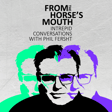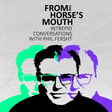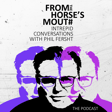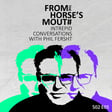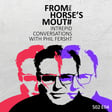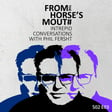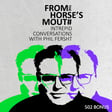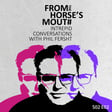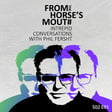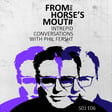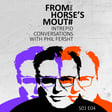Introduction to 'From the Horse's Mouth'
00:00:12
Speaker
You're listening to From the Horse's Mouth, intrepid conversations with Phil First, ready to meet the disruptors who are guiding us to the new great utopia by reshaping our world and pushing past corporate spin for honest conversations about the future impact of current and emerging technologies. Tune in now.
Meet Laura Gassner-Otic
00:00:38
Speaker
So today, um I'm very honored to be joined by ah Laura Gassner-Otic, who's with a wonderful background. And I'd like herself to maybe introduce herself to our audience um because I think a lot of what she is doing is very relevant to the industry that we're in, ah particularly at a time when we're going through such change ah socially, economically, and politically. So so Laura, I'd love to a bit more about your background and what you're up to today. ah Sure. so I guess I make my living as an author and as a keynote speaker. I am the author of two books. I'm a Wall Street Journal best-selling author of Wonder Hell, ah at the the book that was inspired by a TEDx that I gave that's got 2.5 million views, crazily enough, and Limitless, ah the book that was inspired by 20 years of working in executive search.
00:01:35
Speaker
ah yeah Everything that I think about is based around this question of why success doesn't always bring happiness and what actually engages us to do the very best work we can. How do we bring everything we are to everything we do? And so I think what we're the intrepid conversation we're having today I think is about how do we engage ourselves, our people, how do we become limitless leaders to our companies, our communities, our country, ourselves, and really ah do work that matters.
From Law School Dropout to the White House
00:02:06
Speaker
So um you you began your career our as an appointee in Bill Clinton's White House, right? so Can you talk a little bit about maybe that and how you evolved from from that?
00:02:19
Speaker
Yeah, i ah I dropped out of law school because I heard this unknown governor from a tiny southern state talking about this idea that there's nothing that's wrong with America that can't be fixed with what's right with America. And even in our super divisive times that we have right now in our election season, I still believe that to be true.
00:02:40
Speaker
I do believe that there's more that unites us than divides us. And this this this governor, Bill Clinton, was talking about this idea of service, community service in exchange for college tuition. So your you're you're you are improving your community while you're also improving yourself. And so it's this collective growth and development and betterment while you're also giving yourself like a bootstraps up way to sort of get to ah the place that will change yourself and change you know generations to come. and When I heard him talk about that idea, i had I had been in law school because I thought I myself was going to run for office. I thought I was going to have solve all the problems and I was going to do all the things. and Then I heard him talking about this idea and I was like, that needs to happen.
00:03:26
Speaker
That needs to happen. And so I literally ah started volunteering on the campaign. About three weeks later, all four principals, Bill and Hill and Alan Tipper Gore, all came to Gainesville, Florida. And we got 36,000 people to show up at this rally. And the national office was like, who are those volunteers? We should employ them. And by employ, they meant we should put them on payroll, making zero dollars, but all the ramen soup and cold pizza and idealism you could eat.
00:03:54
Speaker
And one thing led to another and I ended up putting my car on the auto train and, you know, going to Little Rock and then move into DC and working on the transition eventually, working in the office that actually created the national service program AmeriCorps as a political appointee. Awesome, some awesome. um I actually met Bill Clinton a few years ago in a conference in Poland and he he literally cornered me after the event and just chewed my ear off for like 15 minutes.
00:04:21
Speaker
He will do that. But he doesn't, you know, it's really funny because he is, you know, he's a vegan now and he is, he's this like wizened little man with this gigantic head and these fiery blue eyes that still have so much intensity and passion behind them. And when he talks to you,
00:04:41
Speaker
It is like pre-glide. It is like you were the only person in the room and when he walks away, you still feel feared by them in a way that you just like, even as you know an elder statesman, you could you can understand the idea that some leaders have charisma. like Some leaders have this it factor, this thing.
00:05:02
Speaker
that that and that others don't, right? It's like this thing that you're sort of bored with and just the that the sort of fire and the light in his brain is is is still ah magnificent.
00:05:16
Speaker
Yeah, no, I and mean, he he began his speech where we all thought social media at the time was a good thing. Turns out not so much.
Social Media's Influence and Civic Education
00:05:30
Speaker
I mean, i mean ha how much, when we look at what's happening in the state of the society we're in today, the tensions going on at the universities, the misinformation that is flying around the place, how much of this do you think is blamed on too much information available to people who don't have the maturity to digest it? um Or is this a flip on, hey, when we were 20 years ago. We didn't have enough information. We sort of just relied on a couple of sources. I mean, what what do you think is going on on there ah in the world today when it comes to social media?
00:06:09
Speaker
You know, it's it it's such an interesting question because I could probably argue all sides of the coin all day long on this. And I don't actually know if it's a question of maturity. that So people are getting misinformation ah that they are mature enough to handle. I just gave a keynote in in Dallas, Texas two days ago ah to like 1,200 people working in the staffing industry. And on the on the ride from the hotel to the airport, I had a driver who During the 45 minutes, I think, proceeded to tell me about 15 different self-researched ideas he'd had that I can best describe as conspiracy theories at best, right? I mean, it was everything from, you know, the sun doesn't cause skin cancer, it's actually it's actually yeah skin it's actually sunscreen that causes skin cancer, and the FDA is in bed with the doctors, and it was just, it was it was like,
00:07:04
Speaker
insane. ah you know And he said something like, well, 50 years ago, our kids had 20 vaccines, and now they have 72. So like clearly, the FDA is making some money. I'm like, or maybe science has just advanced, right? like So and the problem with it is that every one of these conspiracy theories and the misinformation and all that starts with a kernel of truth. And then it gets blown out of proportion by people who feel like they're missing out on whatever is being given to the people who are part of that scene.
00:07:32
Speaker
As far as the misinformation and what's happening on college campuses, I have a different theory. And my theory you is that it's all algorithm based. So if you were somebody who was, quote unquote, doing the right thing during the pandemic, quote unquote, during the right thing during Black Lives Matter, quote unquote, during the right thing during any social upheaval over the course of the last seven or so years, you were filtered information through from the algorithm of just one side of the argument. And that side of the argument is the side of whoever the oppressed person is that you were following before. And so it's not that you're it's not that you have information that you're not mature enough to deal with. it's that That's the only information you're actually getting because the algorithm isn't giving you the other side of it for you to, in your mature brain,
00:08:19
Speaker
compare, I see this with my own two eyes. I see this with my own own two eyes. They seem to be at odds. So clearly there's something not true here. Let me try to figure out more. And I don't think we're giving people enough information so that they can learn about it. I also think that that social media has become the root of so much of our our unhappiness as a culture and so much of our unhappiness at work because we're also fed these false ideals I call them the four horse of the success apocalypse, passion, purpose, happiness, and balance, that we should be following these things that if we get them, we'll be super happy. And we're given this idea that it's all about wealth, and it's all about money, and it's all about prestige, when in fact, really, each one of us defines what makes us happy very differently. And so as managers, if we're like, oh, my person's not happy, let me push the easy button and just pay them more money,
00:09:11
Speaker
Maybe that makes them more happy for a short amount of time because that's what they think is supposed to make them happy, but it doesn't fulfill them. And so they end up back in your office three months later with that, like, what have you done for me lately face on? So it's actually not allowing our people to be engaged in their work because we don't actually know what engages our people on their work because we're looking at social media and letting that define it for us. Yeah.
Media Ownership and Regulation Debate
00:09:33
Speaker
and um What do you think about the fact that these social media platforms are owned by corporate entities or Elon Musk or whoever, at picked the Chinese firms that own TikTok? Do you think that there should be some type of change or regulation made because um ultimately, if information is free, but it's owned by people who have and political biases like Musk,
00:10:05
Speaker
It's something we've done about this in your opinion. I mean, I think, I think millionaires or go back a hundred years ago, multi-hundred heirs, right, have always had political affiliations and political ideals. It's just that it's just that a hundred years ago, they built symphonies and parks and institutions, universities, right? but rockefelers in The and like they they theyre they, they were, there was just as much like union busting and, and, and abuse of but ah
00:10:35
Speaker
you know those who had less by those who had more 100 years ago, you just we didn't see as much of it. And also they masked it with more things that were better for the common good than social media. I do think it's a problem that you know the vast majority of people get their views from you know one of six different outlets and those outlets are basically owned by three people. I mean i i think that is a little problematic. I don't have a solution for it though. you know It's like Churchill said that democracy is the worst form of all government except for all the rest. right like ah i don't I don't have a solution for it, but I do.
00:11:10
Speaker
If I were to wave a magic wand and create some solution for it, what I would do is I would actually not do anything about social media or the news. I would just put civic education back in our classrooms, teaching people what it actually means to be a citizen, why why voting matters, why the person you that you vote for for mayor has more to do with your life than the person who you vote for for president.
00:11:32
Speaker
why um um The electoral college is an interesting ah an interesting institution, why we need to pay attention to the Supreme Court, why i you have to vote in primaries to send messages to the government, to the parties about who they should they should they should actually fund, why ah ranked choice voting makes sense and math isn't actually scary. So I think it starts much, much earlier. like we are we are putting We are putting smartphones in the hands of 13-year-olds and we're taking civic education away from them at the same time.
00:12:03
Speaker
And I think that combination is incredibly dangerous and the long tail on that is going to haunt us for millennia.
Pandemic's Effect on Work Culture
00:12:10
Speaker
Yeah. yeah mean I mean, I've listened from the UK and the situation of news media being owned by politicians or being driven by political agendas is unthinkable.
00:12:25
Speaker
um I would love to do what you do in the UK and have um question time, right? To have the president, like the MP, stand in front of Congress like once a month and just have people barrage them with questions on live television. I think that we would get a much more intelligent class of politicians if we actually did that. We also might just get more showboating, I don't know. But um I do think there are things that we could that we could learn.
00:12:52
Speaker
Yeah, definitely. There's been an interesting four or five years in the world. We obviously, the impact of pandemic, and I operate largely in the technology industry, and that's had a lasting effect on the work cultures. In this business, you probably saw that Amazon is now pulling everyone back to the work week from January. um It's interesting, I've been interviewing Gen Zs now, and a lot of them want to go back to the office.
00:13:22
Speaker
So a lot of the younger folks, they're like, i got I've got to go back to the office. i and I'm a mammal. I need people. They've realized they're not going to learn about their careers if they're staying at home. And a lot of them also realize they need money. Mom or dad and dad are eating in the family forever, right? um So do you see a rebound back to a world before a pandemic that's happening? Or do you think something else is occurring in society?
00:13:48
Speaker
So what's very interesting about this is that my company has run and so an online assessment, a global online assessment with 56 different questions and then like a whole demographic data set ah since January of 2019. And we have almost 7,000 responses from 74 different countries, every possible demographic, every possible industry, all ages, all races, everything.
00:14:12
Speaker
And what we found was that even though over the course of the last few years, we've seen a lot of headlines about the quiet quitting and the great resignation and all of that, it turns out that worker engagement attitudes really haven't changed that much. So we have 7,000 responses from before, during, and as we come out of the pandemic. And we actually haven't found that much has changed, except for in one particular area. And that one particular area is control.
00:14:37
Speaker
How much control do people feel like they have over their work? Because the amount of control that you feel like you have gives you safety and security and makes pure you feel like you have options. And even though it looked like we had a ton of control, March 2020, all hell breaks loose, and the managers were like, just do what you need to do, do whatever you need to do, keep the place afloat, like mission critical, work when, work how, work where you want.
00:14:59
Speaker
It turns out that that that was that gave us the appearance of control, but it actually didn't give us brute control. And what workers are telling us that they want is that they want control over the work environment. They want to be able to impact the work environment where they work. They want to be able to have control over the teams and the projects on which they're assigned. And they want to be able to have some kind of control over the amount of hours they work and how much money they earn for those hours.
00:15:24
Speaker
That's what they're looking for. What we also further found was that, um and this is at Rocket Science, bad leaders bleed out team members. Big shocker. All of you listening to them this podcast are like, I didn't need to listen to the podcast for that. But here's what we did. We focused our research specifically on people who say, I work for a, quote unquote, good leader.
00:15:44
Speaker
A quote-unquote good leader is somebody who has a good reputation, they deliver good results, they've been with the firm for a while, right? They are they are they're known as a good leader. People who say, I work for a good leader, but I have no relationship with that leader are just as likely to leave as somebody who says, I work for a bad leader.
00:16:02
Speaker
So if you're a good leader and you've done all the trainings, you've done all the courses and you watch masterminds and all the master classes and all that stuff, and yet your people are saying you don't know what actually makes them tick, like they know you don't know what they care about, why they're at that company, why they care about the work they're doing, what they're up to every single day, they will leave.
00:16:23
Speaker
And so it makes sense that workers want to come back to the office because they feel so disconnected from the people who are actually allowing them to have some control over their work environment, over the projects and the people, over the money and the hours.
00:16:36
Speaker
so And even though we know as managers, they're not going to learn, they're not going to grow unless they're in the office, they're actually feeling the same thing. And it isn't just because of the pandemic. They've wanted this all along. They're just feeling in a much more increased way in this one particular area. And
Employee Engagement and Personal Values
00:16:55
Speaker
it's interesting. I mean, I i put it to get people back to office and, you know, some people just say, yeah, I'll come back to the office, but make it worth my while.
00:17:04
Speaker
he great I'll have some ideation sessions. We're going to go to the lunch. we I'll make it fun, right? That's okay, I don't mind. I have staffs complaining about the commute time. And I'm like, you what, you mean having 30 minutes to your end thoughts every day? It's actually sad. And someone else literally said, my employer doesn't dictate who I socially interact with anymore. Literally said, it's not up to you, boss, to tell me to hang out with my co-workers. I have met with who I choose to hang out with.
00:17:37
Speaker
And I'm getting to the point of, yeah, but I choose who I want to work in this company. I don't know if I like your attitude. i thought and You know, it's it's interesting because I think in the tech world, especially for years, they were like, we've got ping pong tables and beer on tap and kombucha, though you know, the break room. And and that doesn't actually that doesn't actually bring happiness at work, like the pre dry cleaning and the bring your puppy to work and the best friend in the next cubicle build. That that is a stand in for happiness. It is a it is a it is an ephemeral thing.
00:18:07
Speaker
And frankly, it can be replaced by the person next door who doesn't have the ah ping pong tables, they have axe throwing or like whatever the next thing is, that's more exciting. And so we put our chief HR officers in this position of constantly having to find the next big flashy thing, when the next big flashy thing is temporary. It's not actually true deep fulfillment in work. And what brings true deep fulfillment in work is not success and the fastest, most expedient path to the corner office and this one myopic view of what people want. It's actually ah this fulfillment, this this harmony, this alignment, this consonance
00:18:43
Speaker
where what you do matches who you are. And for years, we used to, like in the executive search world, so after, we didn't talk about the rest of my career, but after the White House, I went from the White House to go work in executive search. And I spent 20 years in the executive search finding C-suite leaders for some of the largest organizations in the world. I spent five years doing that for a big firm and then I had to sort of moment of rage where I realized I could do it better and smarter and faster and with more authenticity, more integrity on my own.
00:19:07
Speaker
I started my own firm, were ran that for 15 years, and eventually sold it to the people who helped me build it. So I spent 20 years in the executive search world. And in executive search, we used to say there are about eight motivating factors. I'll look at anybody excited at any time for a new job. And there are things like, what's the mission of the organization? Am I inspired by the leader? Will it look prestigious on my resume? How many skills will I learn? How deep is the impact? ah Where is the job located? ah How broad is the challenge? And how much money will I make?
00:19:36
Speaker
And we've all been told money, money is number one. But in this research that we did, we found that less than 37 percent of all employees actually said money is the most important factor that determines their happiness at work. And by the way, for the contingent workforce, which is a huge amount of the tech world, that number goes down to 32 percent.
00:19:55
Speaker
so Less than a third of contingent workers are saying that money is the most important factor. so What actually does get them excited? What gets them excited is this ability to control where they are and what they're doing. They also want to have some sort of alignment between who they are at home but and what they're doing at work. so All of the exhaustion from the busyness, it's not because they're too busy, it's that they're too busy doing things that they don't care about.
00:20:20
Speaker
they want to actually They don't want to have costume changes and code shifting from homework. They actually want not work like balance, but work-life alignment. They want to be able to talk about what they do with their friends and be proud of the company they work, the leader they serve, the cause that there're that they're helping, the business that they're building. um They
Redefining Success Beyond Social Media
00:20:37
Speaker
actually also care about, even if they don't want to socialize with people around them, they want to respect and and and admire and want to emulate the people with whom they work as well. So there are a lot of other things that people are looking for that are not just this sort of old one-size-fits-all definition with these old motivating factors all in one specific definition. It's important for leaders to talk to their people and say, well, which of these matter to you? It's not just like the value of the job. but It's the value of the job to you in particular, because otherwise you get workers who are interested, but they're not invested and you can't really go through chaotic times like we're in now and major moments of change and transformation if your people are just interested but not invested. That's fantastic. um
00:21:24
Speaker
We do so much on the work-life alignment. It means a lot in terms of getting people truly passionate about what they do. I mean, you've run a company, I've run a company and nothing substitutes passion. Once you're passionate about something, you never think, am I too busy? It's do I have enough hours in the day to do stuff that I'm really passionate about? What's my opportunity cost?
00:21:48
Speaker
But we get passion wrong also. Everyone's like, you know, follow your passion as if all you need to do is find your passion and then follow it and everything's going to be great. And what that tells our young people who are getting their life advice from social media is that all you have to do is find your passion and follow it and everything's going to be perfect. And that means the first time the project goes wrong, the first time you lose funding, the first time the customer says no, the first time you're favorite client leaves, but your worst employee stays. You're like, I guess this must not be my passion. I should do something else. And everyone's like, oh, tell me what you would do if you knew you couldn't fail. That's your passion. And I'm like, no.
00:22:25
Speaker
Tell me what you would do if you knew for sure you would fail and yet you would do it over and over and over and over until you got it right. Because our passion is going to pick us up and throw us down and gut us. Our passion is going to teach us lessons. Our passion is going to make us work for it. But isn't your passion worth that? And so I think we shouldn't just follow our passion. We need to invest in our passion. But when we use social media to get our life advice, it seems really simple and really easy and really one dimensional when in fact, it's a whole lot harder than that. Yeah. Sorry, that's my, I will be in my body about follow your passion. You caught me on a day.
00:23:07
Speaker
Thank you. I'm someone who did follow his passion. and I know how much pain it took to get there. And when I finally leave the company I've built, I'll write a book ah all about it, but I can't write it now while I run it.
00:23:18
Speaker
Right. And here's the thing. People only see the success. So they're like, oh, he's doing this thing that he's passionate about. He's a natural. And you're like, I'm not a natural. You just don't see all of the work I do in the dark at three in the morning when I wake up early, when I stay late, when I'm thinking about on the weekends, like all the things I did wrong. All you're seeing is the stuff that you bubbled up to the sit t your to your view, which is the view of success. But they don't see everything else that's behind it. And I think by not having people in the office, they don't see the hard work that goes into it. They just see the success. I was raised by um boomers, and my parents grew up at a time where like, you didn't show emotion to your children, right? So like, I never saw my parents fight. I never saw my parents argue. I never saw them cry. I barely saw them sneeze.
00:24:07
Speaker
And then I made it to the workforce and I was like, why am I failing left and right? Like my parents never failed. It was never hard for them. They were just like, made it happen. They only talked about success at the dinner table. It turns out like we actually have to show people all of the hard work. We have to show them the learning and the lessons and the doing hard things. I run marathons and I my kids see me come home and I'm like, yep, I ran 18 miles today. Well, really, I ran five miles and I ran walk the other 13. I make sure that I bring them into the process because if we all bring people into the process, it's a problem. To go back to the research that we did, we found that
00:24:44
Speaker
less than half of all employees understood how their work impacted the weekly, monthly, or quarterly goals of the company. We found that less than half of employees understood what those goals even were. And we found that less than half of all workers understood what they need to do every day to get to those goals. Because we're just not showing our workers, our teams, the process behind the but what has to be done and then why their work actually matters. And so I i Yeah, I know I sound like an old soggy when I'm like, people have to go back to the office, but they have to at least be in the office enough at times that are important in that matter so that it can build those relationships and the in between moments between the let's just show the success points. Yeah. And the personal sacrifice that people have to put in to get them, achieve their passion.
00:25:35
Speaker
And this goes back to that question, yeah, this goes back to that question of getting all of our definitions of success from one place, because you can't be insatiably hungry for someone else's goals. So if somebody
Political Support and U.S. Political Divide
00:25:46
Speaker
is like, you need to go do this thing, but you don't really care about it, and when push comes to shove, you're just not going to make that personal sacrifice.
00:25:53
Speaker
And so all that work will be for nothing. You will have wasted capital, you'll have wasted people, you'll have wasted ah you know you'll wased time. So we really have to figure out what we actually truly care about because it takes a lot to be successful and you you won't do it if you don't actually want it. People are like, I'm so busy. I'm like, you're not so busy. You just don't care. And that's fine. Like, it's fine if you are too busy to start that business. It's fine if you're too busy to go back to school. It's fine if you're too busy. to train for the marathon. Maybe you just don't care about it because if you cared about it, you would do it. And it's totally fine to say, I don't care about this thing. Go find the thing you actually care about and dedicate your work and your life to that and be amazing at it. But stop trying to shoehorn yourself into someone else's definition and of success because you're not going to be as good at it as you could be somewhere else.
00:26:43
Speaker
Absolutely. That's wonderful.
Future of Politics and Ranked-Choice Voting
00:26:45
Speaker
I have one final question, particularly because of your political background. ah I made a choice a few days ago to over-primarily back, come out after president, put it on my LinkedIn in front of my 70,000 followers.
00:27:02
Speaker
Did you get a idea? No, this is going to create a shit stop. But I was very, I liked it was I said, these are the four reasons why she's my bet. I didn't say anything about Trump or anything like that. I just thought she said, I love her. She's doing a small business. She's supporting the middle class. And we need a woman as a frickin president. I'm sorry. yeah this I think she hit those three hit those things. I'll put it out there. um I think I lost two followers out of 70,000.
00:27:33
Speaker
Um, I only got about three nasty grams. I just blocked a lot. Just anyone's who's rude and abusive There's a couple of republican friends who actually look pretty nice They said Jim this guy's shown some car on his he actually got respect for someone to say This person actually done up and took a side and say hey, I'm voting for this person. And this is why Because i'm so tired of the divide right now. It's it's almost soul destroying what's happening in this country And i'm like, look i'm very concerned. This is why Tell me why you're voting for Trump. I've got a friend on my vote for Trump because he's Jewish guy and he's, I think, Trump's vote for Israel. I go, you're a single Israeli, I had an issue with that, but thank you for sharing your opinion, right? Yes, yes. Well, I'm Jewish and I'm not voting for Trump's. I'm Jewish, so am I.
00:28:23
Speaker
yeah Well, I mean, look, i I put up a post on LinkedIn that was like lessons that we can take from the debate to propel all of our careers forward. And I i wrote about how um ah how convalesce nervous in the first question. Her mouth was a little bit dry, but even that she like hit her stride. ah She tried to talk about issues he didn't. ah but i But I tried to be very sort of even keel. There were some things he did well. There are some things she did well. But i did get um I got a a few people who responded who like went a little like, oh, well, you talk about how he was rude, but you don't talk about how she was making all these faces. I was like, this is not a political post. I appreciate your opinion, but this is really more about how what we can learn from from these moments. But no, I'm on i'm the same. i mean i
00:29:09
Speaker
i actually i mean i'm a i'm obviously by resume and by you know each of the things that I've said today, a fairly progressive Democrat. um But when I was in high school in the 80s, I'd skip kindergarten, so I was a year younger than the rest of my classmates. And I remember walking around with voter registration forms when they were all turning 18 and I was still 17, encouraging them to vote for to to register Republican to vote for Ronald Reagan. and like I was a tried and true like Reagan Republican.
00:29:36
Speaker
and And I remember that like Ronald Reagan and Tip O'Neill would fight all day long about issues, but then they would get together in the Oval Office and have a scotch at the end of the day. like i i I would like to get back to a time where we have statesmen and stateswomen who who who actually put country before party. I'm a big fan of veterans in office, whether they're veterans of the military, Peace Corps, or AmeriCorps, ah public service. I think people who have a track record of putting ah the the the the country before themselves and their party would be better.
00:30:08
Speaker
for our country. so But I i do. i i think it's I think it's brave. I have a lot of friends that are like, I would never talk about politics publicly, but I'm like, they'll lose clients. And I'm like, i anybody who doesn't want to hire me sees Bill Clinton in the first line of my resume, so they're already not going to hire me. What can I do? um But that's good to hear that you only lost two followers. It's it's its its it's surprising, actually, and and i'm and I'm happy about that.
00:30:35
Speaker
Yeah, I just I think I took the attitude on I'm predominantly in tech and operations. Most people I deal with tend to be fairly reasonable in television individuals. And you have a platform and with the platform comes responsibility, I think I don't think you have to talk openly about where you stand about a candidate. But I think talking openly about what are the issues that are actually important. I think people who have platforms do have a responsibility to do that. So well done you. Thank you. Wonderful. And do you think It's going to get better. Do you think this is just a one dark period in our political history that will heal?
00:31:15
Speaker
I do. I think our country survived the 60s and the early 70s. I think our country will survive this. I think four million young people turn 18 every single year and the country is going to get younger and blacker and browner and gayer and more women in office. And I just that can't be a bad thing. I think that um I think the Boomers did a lot of wonderful things for the country. I think they've also held on to power for a very long time. And it would be nice to have some Gen X leadership. It'd be nice to have a Gen X around the Supreme Court, right? You may not even have one of those. um But i think I think balance is always better. I think conversation is always better. I think listening is always better. And I think that
00:31:58
Speaker
um the that that it's time for better and different voices to become heard. I mentioned rank choice voting earlier is something that I think we would get if we have civics education back in our in our school. Rank choice voting is incredible because it means you can go into the the the voting booth and you can vote for your candidate of choice even if your candidate of choice has no shot ever of winning just to send a message to the parties that you want to see in more candidates like that and then know that whoever you vote for second as your safe choice is still going to have your support so you're you're still going to get you know the person on your side of the aisle still going to win
00:32:35
Speaker
But you also can send a message about the kind of candidates you want to see more of in the future. And I think it's the best antidote to our two-party system, rather than running these third-party candidates that never get any traction and just end up being spoilers. We can actually do it in a way that allows people to feel much more secure and comfortable in voicing the direction they want the country to go. Wonderful.
Conclusion and Listener Engagement
00:32:56
Speaker
Well, this has been a fantastic conversation. ah Laura, that's the audience. I really look forward to sharing this with our community and um I hope we hear a lot more from you in the future and bar hear more about some of your books that you're putting out and and some of your views on the future of the workplaces. Well, thank you so much. It's been great, son.
00:33:22
Speaker
Thanks for tuning in to From the Horse's Mouth. Intrepid conversations with Phil first. Remember to follow Phil on LinkedIn and subscribe and like on YouTube, Apple Podcasts, Spotify, or your favourite platform for no-nonsense takes on the intricate dance between technology, business and ideological systems. Got something to add to the discussion? Let's have it. Drop us a line from the horse's mouth at.com or connect with Phil on LinkedIn.

